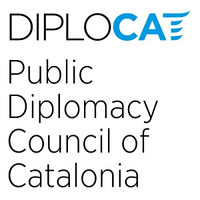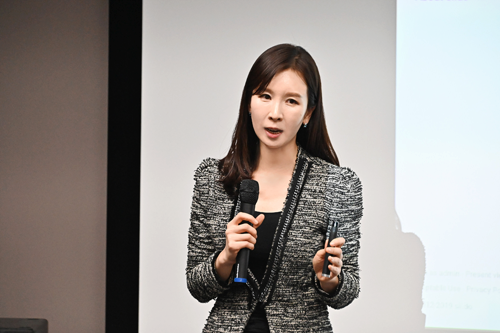AI: The Next Frontier in Public Diplomacy
USC Center on Public Diplomacy, April 23, 2019; original entry contains a videoIf artificial intelligence (AI) is the future of technology, what's its role in public diplomacy? [JB emphasis]Watch an exclusive video interview with Kyle Matthews, Executive Director of the Montreal Institute for Genocide and Human Rights Studies (MIGS) at Concordia University. Matthews spoke to CPD at Diplocamp 2019 during PD Week in Brussels, which convened diplomats, thought leaders, scholars and more to learn and share best practices for how technology is fundamentally shaping the field of public diplomacy."There isn't one AI. ... It really is, people say, a technology that's going to transform the world—it's going to transform economies, it's going to transform international relations, so it's really important that we study this," says Matthews. "We need to build a core group of people in academia, in think tanks and in governments who are going to share best practices an..
Hague Journal Special Issue [on Public Diplomacy] Published
USC Center on Public Diplomacy, April 26, 2019
A special edition of the Hague Journal of Diplomacy titled, "Debating Public Diplomacy [JB emphasis]: Now and Next," is now published and available digitally here.Edited by CPD Director Jay Wang and CPD Faculty Fellow Jan Melissen, the collection features 12 essays reflecting on how the evolution of the global information environment presents new challenges for public diplomacy practitioners and academic analysis.“Making sense of what is going on now, and what may be next in public diplomacy, is as relevant for rising powers as it is for declining states," write Melissen and Wang. "It matters to powers big and small, and those in the middle or occupying policy niches, as it does to an array of non-state actors.”This forward-looking issue covers today's critical public diplomacy topics that will only grow more pressing as the field continues to be shaped by the new global media landscape. Contributions include the following chapters b..
Jazz Ambassadors: An Instrument of Public Diplomacy
Mariami Khatiashvili, The CPD Blog, May 2, 2019
uncaptioned image from article
Jazz, as a cultural phenomenon, can comprehensively illustrate U.S. culture and society. As a component of U.S. public diplomacy [JB emphasis], it can reasonably tell an American story to foreign audiences. Since 1956, after the U.S. State Department created the Jazz Ambassadors program, jazz diplomacy not only defined the success of U.S. public diplomacy in the Cold War, but became one of the universal symbols of the United States in the country of Georgia, a Soviet Republic at that time. Until 1978, before the U.S. State Department directed this jazzy instrument of public diplomacy, Georgians experienced the American value of freedom through jazz rhythms.Soviet socialist realism forbade everything Western, especially American, including freedom of pro-Western thinking, and freedom of experiencing U.S. values. Soviet ideology regarded American jazz as “corrupt” and “dissident.” In this case, only high-level..
Public Diplomacy Council holds first event after forced closure
ACN, Catalan News, May 3, 2019
Diplocat secretary general says body will 'continue' work of officials in charge before Spain shut it down in 2017
ACN, May3| Barcelona
Catalonia's Public Diplomacy [JB emphasis] Council (Diplocat) has held its first event after the Spanish government closed it down in October 2017 when it took over Catalonia's administration.
The consortium hosted a seminar on public diplomacy [JB emphasis] on Friday at Barcelona's old Sant Pau modernist hospital.
Talking to the press, secretary general Laura Foraster said the body will "continue" the work of the officials that were in charge before Spain imposed direct rule.
According to her, Diplocat's goal is to "export the image, assets and values of Catalonia abroad."
She expressed plans to draft a strategic plan with the approximately 40 public and private institutions that make up the consortium.
The Catalan government, Barcelona's local council, several universities, trade unio..
German and American Fulbright Scholars Visit U of A to ‘Build Bridges’
news.uark.edu, April 30, 2019
FAYETTEVILLE, Ark. – German and American Fulbright scholars and guests will convene on the University of Arkansas campus May 17-19 for a conference aimed at understanding the trajectory of trans-Atlantic ties and the future of international cooperation.The conference, “Building Bridges: The Fulbright Legacy and the Future of International Exchange,” is part of the “Wunderbar Together” campaign sponsored by the Federal Republic of Germany. It is co-sponsored by the German-American Fulbright Commission and the University of Arkansas International and Global Studies Program and Office of Study Abroad. It will cap a year of commemorative events on both sides of the Atlantic celebrating German-American cooperation.To kick off this final event, groups of German scholars studying in the United States – accompanied by American former grantees of Fulbright Awards – will complete weeklong road trips from Milwaukee, Indianapolis and Austin exploring middle America an..
The role of soft power in China’s influence in the Pacific islands
Richard Herr, aspistrategist.org.au [ASPI - Australian Strategic Policy Institute] April 30, 2029
Just why the concept of soft power has become such an accepted explanation for the spread of Chinese influence in the Pacific islands is something of a conundrum. (The term ‘Pacific islands’ is used here with the narrow meaning of the small member states of the Pacific Islands Forum.)There seems to be little evidence that regional states have the sort of admiration for, and desire to emulate, China’s political or economic systems in the way Joseph Nye framed his idea about the attractive power of non-coercive influence.It was the geopolitics of the Cold War that motivated China to seek a place in the Pacific island sun, not some soft-power pull from regional states seeking to a model to follow. And, for nearly two decades afterwards, Beijing scarcely made a ripple in the regional lagoon, which ended with a flurry of ‘dollar diplomacy’ competition with Taipei for recognition.A main motivat..
On the social media ‘battlefield,’ the Israeli army has weaponized snark
Sam Sokol, jta.org, April 30, 2019; original article contains video
Image from article, with caption: (Photo by Quique Kierszenbaum/Getty Images; photo illustration by JTA staff)
JERUSALEM (JTA) — Earlier this month, just hours before the start of Passover, the British Labour Party tweeted out holiday greetings to its more than 671,000 followers.
“As Jewish people prepare for Passover, we’re wishing everyone in the Jewish community chag sameach,” read the now deleted message, which was accompanied by the image of a Star of David, a kiddush cup — and a loaf of bread.
The image of a food specifically prohibited on Passover, in a tweet from a party battling allegations of institutional anti-Semitism, immediately created a firestorm on social media.
Responses ranged from enraged to humorous. Joining the fray was the Israeli army, whose official account tweeted a “Happy Holidays” message with a similar image featuring matzah, an Easter egg and a Druze pilgrimmage site.
Responses on social m..
Lecture: People Diplomacy: Domestic Engagement in Foreign Affairs
Kwang-jin ChoiDate8 May 2019Time11:15 - 12:45 hrsSeriesDiplomacy and Global Affairs Research Seminar Series 2019LocationWijnhaven
Turfmarkt 99
2511 DP The HagueRoom3.60RegistrationWould you like to join the lecture? Register now.About the lectureThere is a clear trend among foreign ministries and their diplomats towards greater domestic engagement. In the Netherlands, political parties call for greater people involvement in foreign affairs and worldwide we see a variety of drivers calling for a more people-centered diplomacy. Today domestic stakeholders loom much larger in foreign affairs than, say, ten years ago. There is a distinct shift from conventional diplomacy between governments and public diplomacy [JB emphasis] performed for the foreign public to citizen diplomacy 2.0. South Korea’s “People Diplomacy,” (Kookmin Waygyo국민외교) is a new and important government-guided diplomatic experiment in the Republic of Korea. It aims to reflect the people’s need for the democratization of di..
Japan: Will Reiwa be harmonious and peaceful as it is supposed to be?
Darya Gribkova, moderndiplomacy.eu, April 30, 2019
uncaptioned image from article
Excerpt:
On May 1, 2019, Japan enters a new era – Reiwa [JB - see], the era of peace and harmony … with a “baggage” of problem accumulated in the previous Heisei period. By itself, a change of the name with a change of emperor has a rather symbolic meaning and, of course, it is not a specific political programme, – unlikely it will bring any peculiarities to the external and internal political agenda. ...
Despite the countless exercises of experts and politicians in determining of the Indo-Pacific, its core, purpose and structure, it is still unclear, how the idea of the Indo-Pacific region, in which Japan claimsto play one of the leading roles, will develop, and in what form, what institutional structure it could be realized. ...
With many unsolved issues in economic and foreign policy spheres, Japan has a great chance to show to the whole world and feel by itself beautiful harmony during the 2020 Summ..
Dr. Hwa-jung Kim (SNU Institute of International Affairs): ‘Whoever is interested in public diplomacy...
enewsletter.kf.or.kr; via DB - many thanks!
In 1965, US diplomat Edmund Gullion defined public diplomacy [JB emphasis] as “an activity that wins the hearts of the public in other countries and secures their support,” thereby establishing the concept of public diplomacy for the first time. Korea’s Public Diplomacy Act states that public diplomacy refers to “diplomacy activities through which the State promotes foreign nationals' understanding of and confidence in the Republic of Korea directly or in cooperation with local governments or the private sector based on culture, knowledge, policies, etc.” However, it is not easy for individual citizens to recognize themselves as both the subject and object of public diplomacy, as most have never learned about the activities and importance of this very special form of diplomacy. This is why the KF interviewed Dr. Hwa-jung Kim of the Seoul National University Institute of International Affairs, who has long been a champion of public diplo..






![Hague Journal Special Issue [on Public Diplomacy] Published](https://www.bidd.org.rs/wp-content/uploads/2019/05/Hague20Journal20-20Debating20Public20Diplomacy.jpg)






